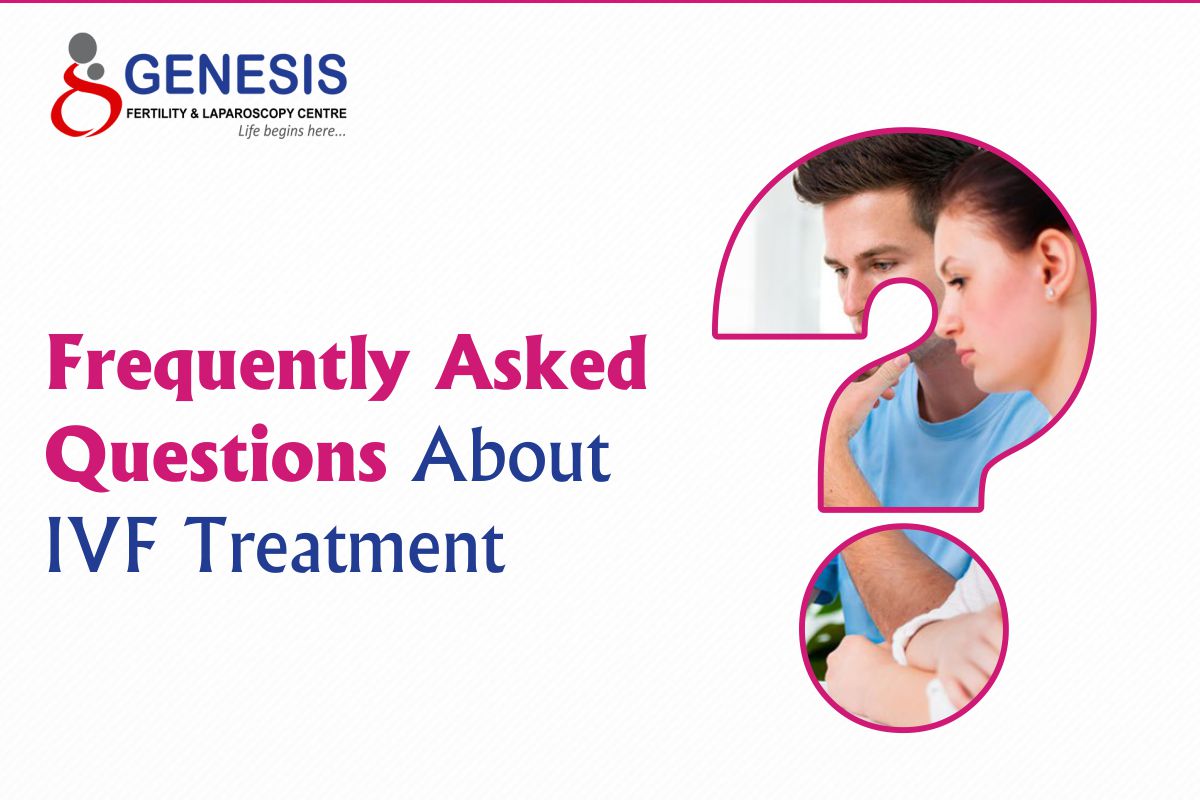Frequently Asked Questions About IVF Treatment
What is In-Vitro Fertilization IVF?
IVF is a procedure where one active and healthy sperm is injected into each egg. So how do we make these eggs?
1. 8-10 days of daily injections to stimulate ovaries
2. 3-4 tracking scans
3. Trigger injection
4. Egg Collection
5. Fertilisation in the lab
6. Embryo transfer
7. Freezing of any remaining embryos
8. Pregnancy test after two weeks
What is the success rate for IVF?
Average Success rate for IVF is 45 to 50%. Couples who opt for genetic screening of the embryos before transfer have a success ratio of 65 to 70%. The success rate of IVF varies on a large number of factors such as age, cause of infertility, ovarian reserve, sperm count and health, etc. It also depends upon the IVF lab standards, fertility expert’s experience and expertise in treating the fertility issues.
Does age influence the chance of pregnancy?
Absolutely YES! Female partner’s age plays a significant role. IVF success has been noted to be higher for women who are below 30 years of age in women and 40 years of age in men
Are there any side-effects with injections?
There are some minor side-effects on the female partner due hormones injections. These include mood swings, cramps, bloating, and breast tenderness. In women with PCO, there is a risk of ovarian hyperstimulation syndrome where the ovaries swell up, fluid collects in the pelvis and rarely in the lungs. A very small possibility of bleeding, infection, damage to the bowel and bladder during the egg retrieval process. All the complications are rare and medical care will be provided until the situation is resolved.
What happens on the day of Egg Collection?
You area sked to attend an hour before scheduled egg collection time. You should be fasting for 6-8 hours prior to the procedure time. You will be taken to the operation theatre and eggs will be collected under ultrasound guidance under sedation. You will not feel a thing. You do not need to fear about the pain. You go home after couple of hours and you will be advised hormones if there is embryo transfer planned.
What happens on the day of Embryo Transfer?
2 -5 days after the egg collection is your embryo transfer. You will be informed beforehand about the date and time. You need have full bladder for the procedure and you will advised to drink water and come.
For almost all women, Embryo Transfer is a painless procedure and feels the same as when you get a pap smear test done. It is done while watching on the scan. Embryos are passed through the cervix directly into the uterus with the help of a thin and flexible catheter. This is a brief procedure and takes no longer than 5-10 minutes.
Can the embryos fall out of the uterus?
NO. Once the embryos are placed they start getting attached to the uterus. They do not move.
How many times can a couple try for pregnancy through IVF?
There is no upper limit on the number of times an IVF cycle can be repeated for a couple. Success rate of IVF increases with each cycle. Most couples need 1-3 cycles, there are some couples who got pregnant in their 8th and even 10th IVF attempt. The decision is based in consultation with your IVF Specialist who will guide you on further investigations or options after unsuccessful cycles. Further IVF is offered as long as the health of the couple and their
pockets permit.
Does the number of embryos influence the chance of pregnancy?
Yes and No! Success rate does not change on the whole but the time to achieve successful pregnancy shortens when more number of embryos are transferred. Let me explain what it means. Instead of two or three IVF cycles, pregnancy will happen in less number of attempts.
Is there a higher risk of a miscarriage in an IVF pregnancy?
About 10% of all pregnancies end up in miscarriage. A slightly raised incidence in IVF is due to the couple’s age and reproductive health issues.
Is bleeding normal in early stages of pregnancy?
Irrespective of the type of pregnancy, bleeding during pregnancy is always abnormal. Therefore, you must, inform the bleeding symptoms without any delay.
What about the chances of pregnancy with frozen embryos?
In an IVF cycle, one or three embryos are transferred to the womb for pregnancy to occur, the other healthy ones are usually frozen, to be used in another IVF cycle. More than 95% of embryos survive and success rate of pregnancy is about 50%, again, based on woman’s age and sperm quality.
Should patients follow a diet before treatment?
A healthy lifestyle (nutritious diet, exercise routine, and ample sleep) plays a vital role in the fertility health of both men and women. Eating a healthy well balanced diet increases the chances of pregnancy. Higher success rates have been recorded for couples who take fertility foods such as green leafy vegetables, carrot, tomatoes, chicken, eggs, banana, citrus foods, almonds, sun flower seeds and dark chocolate. Try to take as many of these items as you can.
How soon after an embryo transfer can I have intercourse?
Sexual intercourse after an embryo transfer in an IVF cycle does not have any side-effect on the pregnancy. However, sex may be accompanied by some bleeding which can make it uncomfortable and stressful.
Should a women be on complete bed rest to increase the possibility of pregnancy?
Contrary to what most people believe, getting tied up to the bed will not increase the chances of pregnancy. Carry on routine activities. Avoid long distance travel and heavy weight lifting. Normal lifting objects, being active, or short distance travelling after IVF embryo transfer does not harm the pregnancy.

